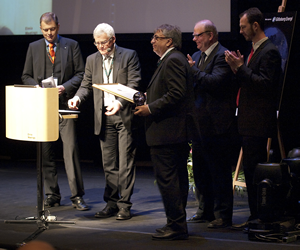 26 May 2010 – Bioenergy doesn’t have to consume resources–on the contrary, it can save important environmental assets. Brazilian researcher Laércio Couto and his team have proved just that, and for this work he is the first recipient of the World Bioenergy Award.
26 May 2010 – Bioenergy doesn’t have to consume resources–on the contrary, it can save important environmental assets. Brazilian researcher Laércio Couto and his team have proved just that, and for this work he is the first recipient of the World Bioenergy Award.
The World Bioenergy Award was awarded for the first time at the inauguration of the World Bioenergy international conference and trade fair on 25 May in Jönköping, Sweden. Competition was stiff, with 90 nominees from around the world. Seven finalists had been selected from among the nominees. The jury chose Laércio Couto as the winner because thanks to his practically focused research he has proven that it is possible to combine consideration for the environment with energy production.
The basis of his work is the eucalyptus, a species of tree that was introduced to Brazil in 1904. Eucalyptus grows very quickly and soon became a raw material for the forest industry. Laércio Couto became interested in eucalyptus when he was a student, and realised it also has potential for energy production.
“Eucalyptus provided the solution to a problem,” he explained.
Saves natural forests
For many years now, Brazil has used the byproducts from sugar cane cultivation as fuel in power plants, but these byproducts are only available for seven months every year. The rest of the time, the power plants have used timber from natural forest and fossil fuels. This practice has both negatively impacted the global climate and caused encroachment into sensitive environments such as the Amazon jungle.
“Adjacent to the sugar plantations are 200 million hectares of land that are not being cultivated and are not suitable for sugar cane,” Laércio Couto says. “We don’t have to chop down a single tree in environmentally sensitive areas.”
Instead, this extra land is now being used to cultivate eucalyptus. The result is that power plants can run 12 months a year on biomass without impacting sensitive environments.
Cooperation is needed
At the award ceremony he thanked colleagues and companies around the world who had contributed in various ways so that mankind has been able to develop theories into practical action.
“A researcher is not a solitary island in the world, nor are companies,” he said. “Everyone contributes a brick but it is only together that we can build a great temple.”
Other nominees for the prize were Pentti Hakkila from Finland, Ralph E. H. Sims from New Zealand, D.R. Ranade from India, Harry Stokes from the USA, John Swaan from Canada and Bernt Svensén from Sweden.
The prize was founded by the World Bioenergy Association and the organisers of the World Bioenergy 2010 conference and trade fair, which is being held at Elmia in Jönköping from 25-27 May.











